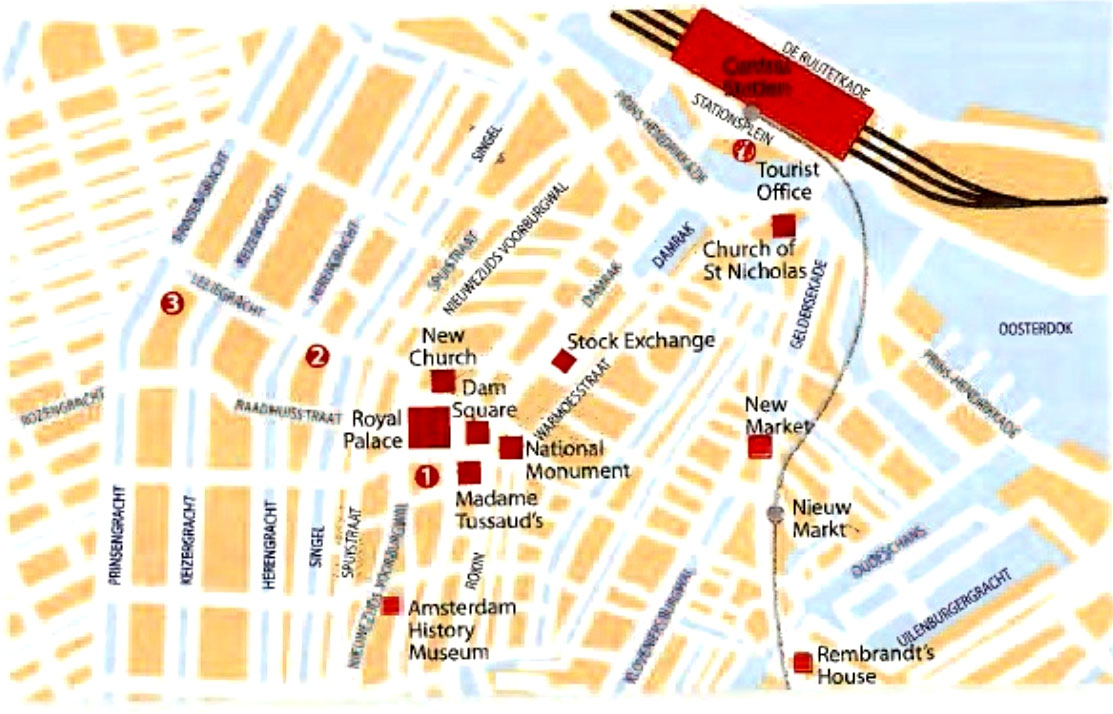Exercise 1
A. Listen to Lizzy’s conversation in the tourist office and answer the questions.
1 Where does she want to go?
2 How far is it?
B. Find the tourist office on the map and then listen again. Where’s Anne Frank’s house: 1, 2 or 3?

Answers
A
1 Anne Frank’s house
2 Two kilometres (or less)
B
3
Audioscripts
TOURIST OFFICER Can I help you?
LIZZY Oh, yes, please. How can I get to Anne Frank’s house?
T Oh, you can walk from here. It’s very easy. Let me show you on the map.
L OK.
T We’re next to the main train station.
L Yeah.
T Go out of here and turn left. Go down the big street. It’s called Damrak.
L OK.
T You’ll go past a big building on your left, the Beurs.
L OK.
T If you continue along Damrak, you’ll come to the Dam.
L That’s the big square, right?
T That’s right. You’ll see the National Monument on your left, and the Royal Palace on your right.
L Right.
T So, turn right and go past the palace. Then go along Raadhuisstraat, here, for about five hundred metres.
L OK.
T When you get to the canal called Prinsengracht, turn right. The house is by the canal, just here.
L That sounds pretty easy. Is it far?
T No, two kilometres, maybe a bit less. It’s a nice walk.
L That’s great. Thanks for all your help.
T You’re welcome. Is there anything else I can help you with?
L No thanks, that’s fine.
Exercise 2
A. Listen to Sergei’s conversation in the tourist office. Which places does he decide to visit?
the Van Gogh Museum?
the Keukenhof Gardens?
Anne Frank’s house?
Answers
Anne Frank’s house; the Van Gogh Museum
Audioscripts
TOURIST OFFICER Hello, can I help you?
SERGEI Yes. Erm, I’ve only got one free day to see the sights in Amsterdam, and I was wondering, do you organise tours of the city?
T Er, yeah, we can, but it’s quite easy to get around the city on your own.
S OK.
T But, erm, you’ve only got one day? That’s not enough!
S Yes, I know, I have to leave first thing tomorrow, so …
T OK, well, er, what would you like to do?
S Erm, I don’t know. Have you got a map or something?
T Yes, we have. Here you are. Er, it has all the sights on it …
S Ah. Thanks. Can you recommend some things to see?
T Well, one of the most popular things to see is Anne Frank’s house. That’s here.
S Ah, of course. I’ve heard of her.
T Yes, this is the house where she wrote the famous diary. Erm, there are often long queues, unfortunately, so the best time to go is early evening.
S Well, that should be OK. It sounds interesting.
T Yes, if you’ve interested in history, it’s definitely a good place to visit. OK, er, we have a lot of museums. So, if you like art, there’s the Van Gosh museum here.
S Ah, right. Er, do you sell tickets?
T I’m afraid we don’t, no. Er, there’s also a science museum – NEMO. That’s here.
S Hm, maybe not this time, but the Van Gosh museum sounds good. Erm … what about this? I don’t know how to say it. The Gardens?
T Ah, yes, The Keukenhof Gardens. They’re very nice but they’re not actually in Amsterdam.
S Ah.
T You have to get a train and then a bus, it takes about an hour.
S Hm, OK. I think that’s too far.
T Right, what else? Erm …
S Actually, I think that’s, er, probably enough. Thanks very much.
T No problem. Have a nice day.
S Thanks.
Exercise 3
A. Listen to Natalie and Paula talking about statement below. Do they generally agree or disagree with the statement?
When you visit another country, you should try to speak the local language.
B. What do they say are the good points about the statement? What are the problems? Listen again to check.
Answers
A
They agree, but they think it’s sometimes easier to speak your own language.
B
Good points:
– it helps you to get to know people
– it helps you to understand them and their culture
Problems:
– it makes conversation slow
– people often reply in English
Audioscripts
NATALIE When I go travelling, which I really like to do a lot, I think it’s very important to try to speak the language of the people of the country you’re visiting. I think it’s a good way of getting to know people and understanding a bit more.
PAULA Yeah, but sometimes don’t you think that makes conversation a bit slow, like if you’re walking around with a little dictionary and you have to sort of look up words every time you want to say something and if the other person speaks your language then maybe it’s just easier to, you know, speak the language that you both share.
N Yeah, I think you’re right in that way. I know when I go to France even if I speak French the people reply to me in English because I don’t speak French well enough, but I think it’s wrong to go to a country and expect people to speak to you in your language. I think if they are willing, then it’s OK.
P Yeah, probably. You’re probably right, yeah.
